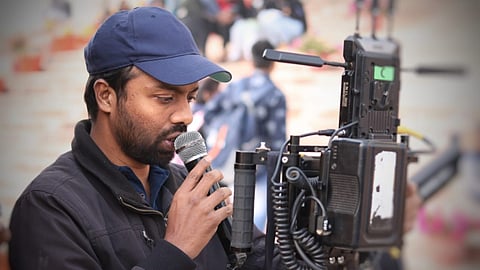

S Ashoka’s directorial debut 6-5=2 (2014) became a hit after its release solely with posters, and he followed it up with the heartfelt romantic tale Dia (2020) that got remade in multiple languages. Now, Ashoka gears up for his third outing. Interestingly, he says that he still experiences fear when approaching a new project, as he opens up about the rollercoaster ride of filmmaking and the fears that come with it. “It’s not uncommon for artists, including filmmakers, to grapple with fear and self-doubt even in the face of previous accomplishments. Success can bring its own set of challenges, including heightened expectations and the fear of failure. Additionally, the creative process itself can be emotionally taxing, leading to moments where you want to relax before you begin your next,” he says.
When it comes to the current state of Kannada cinema, Ashoka digs deep into the dichotomy between big-budget spectacles and smaller, more nuanced films. “There is a misconception that content is the be-all and end-all,” he muses. “But the truth is that it is all about execution and entertainment. It is about finding that perfect balance between storytelling and engaging the audience, which I feel is lacking at present.”
Drawing examples from films across industries, he points out the wave of Malayalam cinema. “Is there any substantial storyline in a film like Premalu or, for that matter, Manjummel Boys? Regardless of the lack of a major plot, each of these films thrived and made huge profits, totaling 100 crores each. Their success is not down to their groundbreaking content but rather their ability to entertain and connect with audiences on a deeper level. At the end of the day, people do not come to theaters just for the story. They come for the experience, for the emotions, for the spark of freshness that ignites their imagination,” says Ashoka. He also takes the example of Animal, which despite criticism managed to attract large audiences and generate significant revenue. “Even my own film Dia is filled with emotions and contains less entertainment,” he adds.
With regard to the balance between creating meaningful content and entertaining audiences—a common dilemma in the film industry—Ashoka says, “This industry has no place for philosophy, and it is my analysis based on the little experience I have gained in making two films."
Ashoka also says that friendship takes center stage in his next project. The Dia director, who has now called for auditions for his next projects, intends to cast fresh faces and is keen on working with newcomers. “The team has received over 200 applications, and we are expecting more after the casting call, which is being looked at to finalise the actors who fit the roles,” he explains. Ashoka gives a hint about the story, saying, “This yet-to-be titled film will be a social drama set in a village, focusing on three youths at different stages of their lives. One storyline revolves around a character during his marriage, another post-marriage, and the third involves a character in love, all running parallel,” he says.